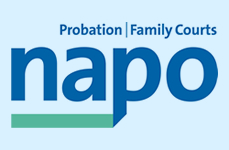The title of the conference was “Working with Vulnerable Young People” and much of the content was extremely thought provoking, moving and powerful. We had two presentations in the morning and four workshops in the afternoon. Napo General Secretary, Ian Lawrence, attended and addressed conference briefly at the start of the day. Ian spoke of his personal experience of being involved with vulnerable children through the medium of you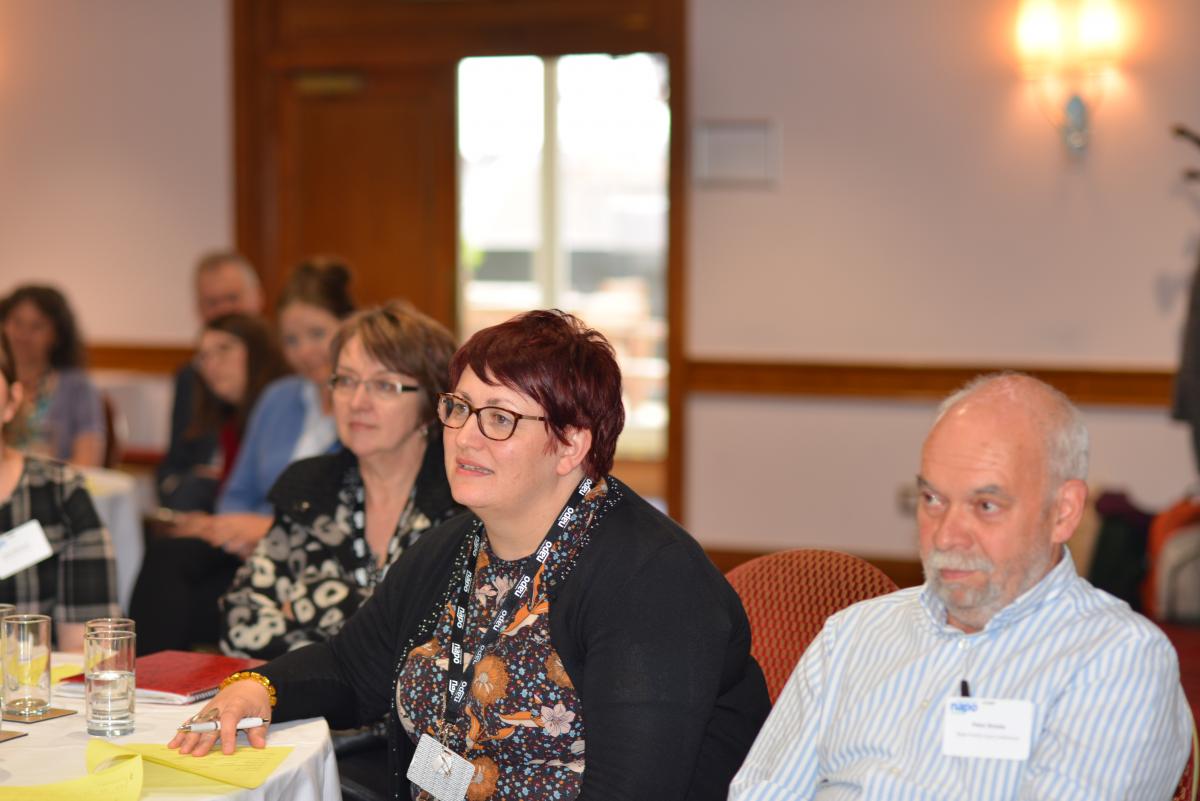 th sport. He took a moment to remind attendees that Napo is still here and still speaking out for members in the justice and family court arenas, adding that a vibrant and viable membership is vital to the continuing success of our Trade Union.
th sport. He took a moment to remind attendees that Napo is still here and still speaking out for members in the justice and family court arenas, adding that a vibrant and viable membership is vital to the continuing success of our Trade Union.
Olivia Fitch is the Chair of the Family Court Committee and is an experienced FCA and trade unionist who utilised her breadth of knowledge in chairing the morning session.
Overall, the conference was a very inclusive and positive event, with lots of learning as well as the opportunity to socialise and share ideas with like-minded colleagues and friends.
The first presentation was given by DS Scott Cairns and DC Emma Bee from the Complex Investigation Team of Leicestershire Police. They highlighted the learning from an investigation into serious (almost fatal) knife assaults on a 17year old Asian girl and her boyfriend. She had run away with him after finding out that her family had previously arranged a marriage to another man when she was aged 13. When she realised she was to be forced into this and would not agree, she was locked up, isolated (removal of phone and laptop) and controlled by her parents. Her absence from school prior to running away had not been acted upon.
They had run to Leicester not knowing that her int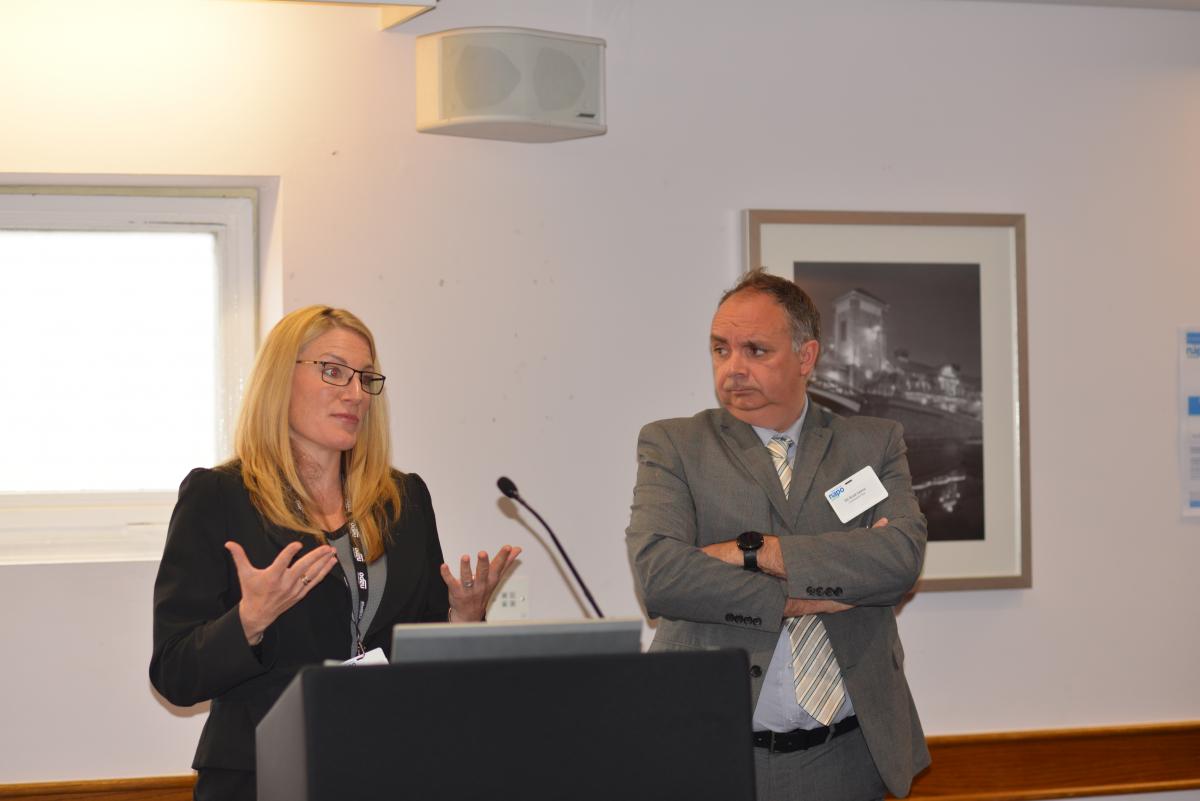 ended future husband was already there and thinking they would be safe. They were found by the family through the Asian community in Leicester. They were attacked savagely in the street by the man her family intended her to marry. The story was told with police audio and body cam footage providing a stark and deeply moving account of the violence and trauma endured by the young woman and her boyfriend.
ended future husband was already there and thinking they would be safe. They were found by the family through the Asian community in Leicester. They were attacked savagely in the street by the man her family intended her to marry. The story was told with police audio and body cam footage providing a stark and deeply moving account of the violence and trauma endured by the young woman and her boyfriend.
Her boyfriend’s family were also targeted and his father was kidnapped. Family members in India were also identified as being vulnerable and needing protection. It is likely that the two young people may have died were it not for the first aid provided at the scene by Police officers. Various family members were involved as suspected perpetrators, including the victims’ parents, uncles and family friends.
Arrests were made for conspiracy to murder and for kidnapping but these did not end in convictions. The initial disclosure at the scene by the girl that their attacker was the man her parents were trying to force her to marry was the only disclosure she made. The perpetrator initially alleged black magic and then self-defence but he was convicted of attempted murder x 2 and imprisoned for the attacks. The victim’s father was convicted of assault but she did not want to give evidence against her mother. She had normalised her family’s behaviour. She had underestimated the danger she was in of “honour” based violence in “shaming” her family by running away with her boyfriend and not agreeing to a marriage they were willing to force upon her at almost any cost. The trial was not flagged up as “honour” based.
A Forced Marriage Protection Order was made and safe housing was provided for the victims. They remain in a relationship and now have a baby together.
Some of the lessons for the authorities were:-
- The importance of recognising at an early stage the vulnerabilities of the victims of forced marriage and the words “honour”, “forced” etcetera pop up as alerts now to Police call handlers.
- The importance of treating victims such as the one above as a child aged under18 in need of child protection procedures is also vital. Victims may not realise just how vulnerable they are.
- Recognition by schools and colleges of unusual behaviour or missing classes by young people who may be vulnerable to honour based abuse or forced marriage can be an important alert, especially just before the summer holidays when families may take them abroad for the purpose of a forced marriage.
- Recognition that families may not be the protective factors one might expect but rather that they may be the direct source of significant harm for the young person. This can also apply to other community members.
- The importance of recording the initial disclosures that a victim may make as these may be the only ones they feel able to. Also the importance of sharing information with other relevant safeguarding agencies.
- That victims normalise abusive behaviour by their families, such as being isolated and locked up.
Scott and Emma went on to address some issues of modern slavery and exploitation of vulnerable people. They noted that “trafficking” should not be confused with people smuggling. Trafficking involves moving people around in order to exploit them (either for their labour or sexually). This movement can be within a building, town or country as well as between countries. Victims cannot now agree to be exploited under current legislation. There is a National Referral Mechanism in place which should be used to protect and deal with trafficked children and young people. “If you don’t get it right first time they don’t get a second chance”.
Jasvinder Sanghera CBE then addressed the conference. She is the best-selling author of her book, “Shame” and the Chief Executive of Karma Nirvana, the organisation founded by her that supports all those impacted by forced marriages and honour based abuse. She is widely recognised for her ground breaking work in these areas and has received numerous awards including Commander of the British Empire in 2013.
Her work is recognised for being pivotal to the creation of a specific UK forced marriage criminal offence in 2014. Her work and her book are underpinned by her own distressing family experiences as a young girl born in Britain of Asian parents whose parents tried to force her and her sisters into unwanted marriages with tragic results. She calls it “A Survivor’s Story”. Jasvinder’s 6 sisters all disappeared from school to be forced into marriage. She considers that schools are at the heart of prevention and safeguarding. From 8 to 18 is the most at risk age.
When Jasvinder was 14 she was told that she had been promised to a man at age 8. She was taken out of school at 15 ½ and locked in her room and isolated. She agreed to the marriage to gain her freedom and ran away when she was 16. She was tracked down by Police. Had they taken her home she would have been forced into the marriage. Women were mainly the perpetrators, mother’s aunts and grandmothers.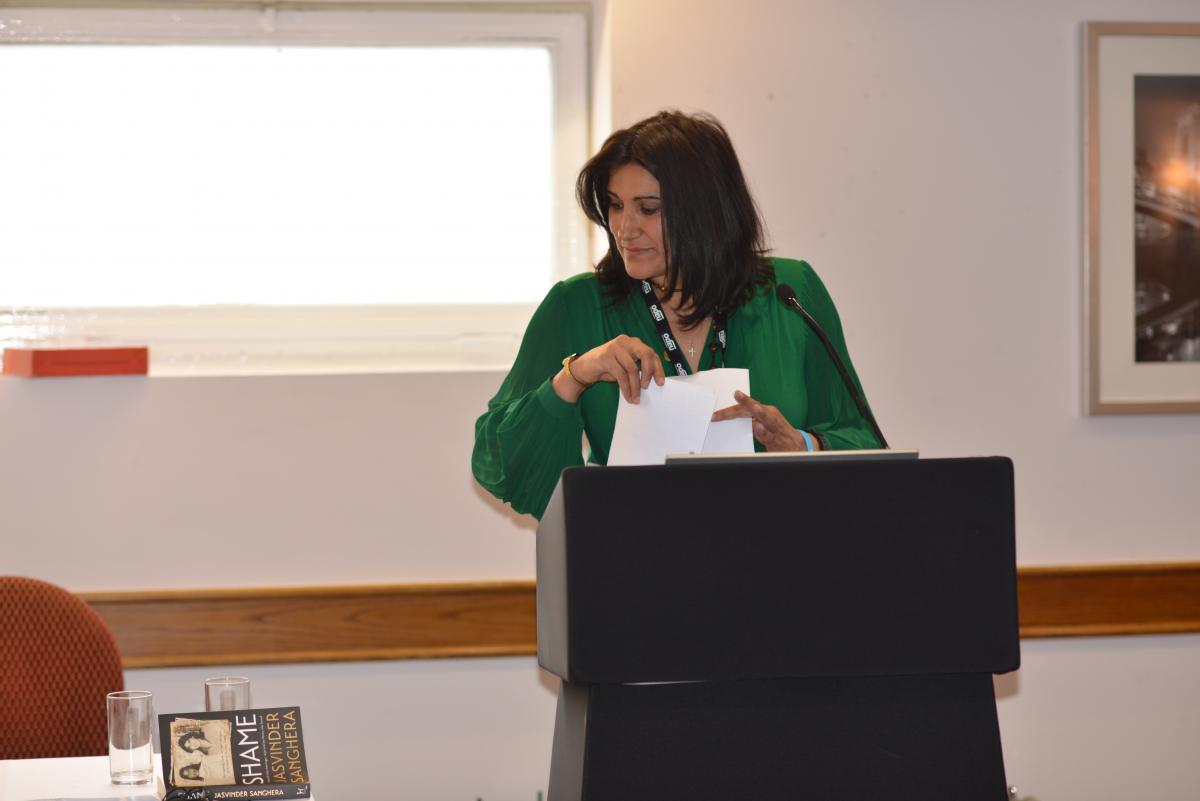
Her mother told her that she had shamed the family and accused her of being a prostitute. Jasvinder wanted to go home but her mother said she had shamed them and was dead in their eyes. You can have your family and not be free or you can live your life. She has been disowned from her family ever since her teens, as have her children.
Following a forced marriage, her sister suffered significant domestic abuse at the hands of her husband. She wanted to return to her family but they reinforced the concept of honour and her duty and sent her back to her husband. She set light to herself in her 20s and died. Her family considered that was better than bringing dishonour.
Central to the aims of Karma Nirvana, which was founded in 1993, are to “Increase Reporting, Reduce Isolation, Save Lives”. Jasvinder described the differences between arranged marriage and forced marriage as being around the ability of the parties to consent to it or whether pressure or abuse are used. A marriage may start as arranged but can become forced. There is a grey area in between. 20% of the victims of forced marriages are men, often gay men, to prevent discrimination and shame.
- Honour Based Abuse is defined as: “an incident or crime which has or may have been committed to protect or defend the honour of the family and or community”.
- It can be distinguished from other forms of abuse as it is often committed with some degree of approval and or collusion from family and or community members.
- Victims will have multiple perpetrators not only in the UK but can be abroad. Honour Based Violence can be a trigger for Forced Marriage.
Best Practice for working with victims:
- Speak to the individual alone, not with family present.
- Maintain the victim’s confidence. Do not approach family without expressed permission – consider risk.
- Reassure them that they are not going against their religion or culture.
- Create spaces for victims to access helplines and websites.
- Implement a safety plan as some victims are returned to perpetrators.
- Offer an option to speak to a survivor.
- Do not use a relative, friend, community leader or neighbour as an interpreter.
- Do not attempt to be a mediator or encourage mediation, reconciliation, arbitration or family counselling.
- Do not disclose information of risk, including ‘perceived’ risk that is deemed shameful by the victim.
- Do not send the victim back to the family perpetrators in the belief that this is not a professional matter.
- Do remind the person that they are not alone. Many survive disownment.
Website: www.karmanirvana.org.uk; Email: info@karmanirvana.org.uk ; Helpline number: 0800 5 999 247.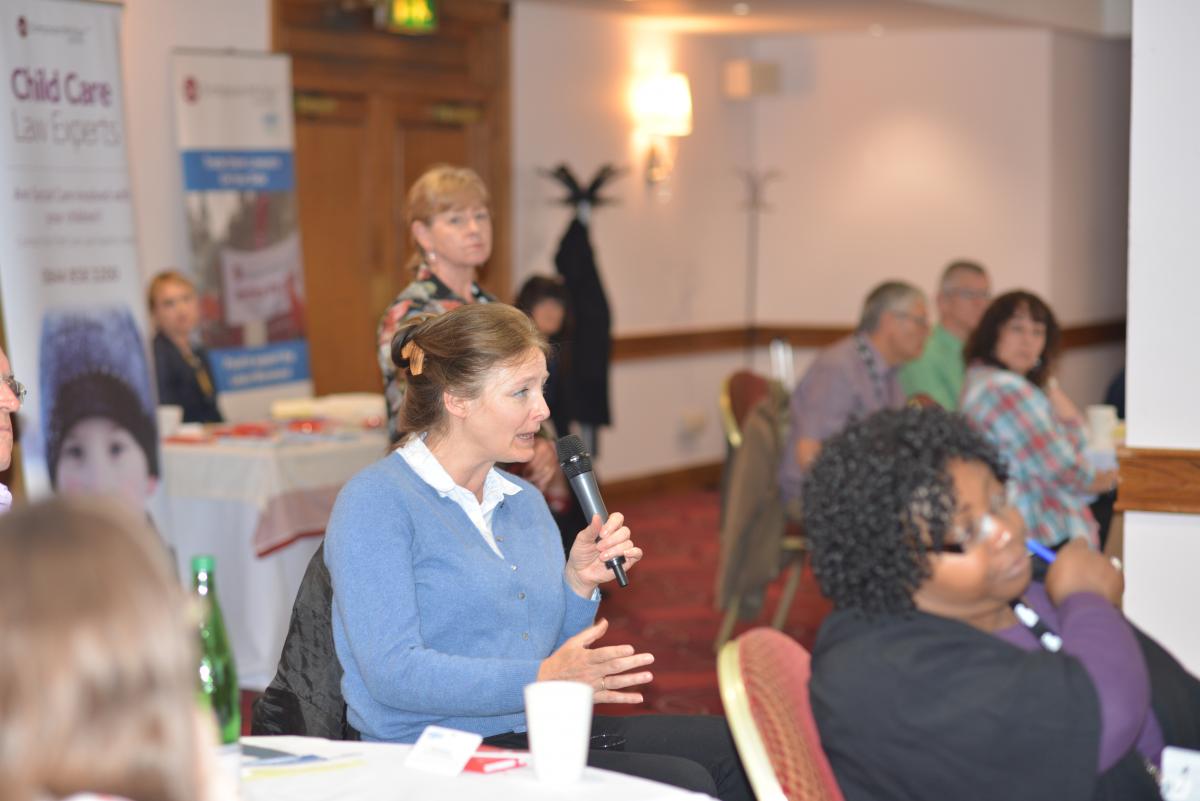
Powerful other messages from the morning speakers were about the importance of accurate recording as this may be needed for Police evidence; the importance of sharing information between agencies including schools, colleges and employers of young vulnerable people and that the idea of “honour and bringing shame” are not part of normal, traditional culture and professionals have a role in telling young people about this. Take the young person seriously when they tell you they fear for their safety and even their lives.
Lord Ponsonby then spoke to the conference about the work of the Parliamentary Unions Justice Group, which has taken over the work of the Family Court Unions’ Parliamentary Group. Lord Ponsonby is the Chair of this group. He has sat in the House of Lords as a Labour peer since 1990. He is a former Wandsworth Councillor and Labour education spokesman. He also sits as a magistrate in Hammersmith and has been a leading light of the Magistrates association.
After lunch delegates were able to choose to attend two of the four workshops that were available.
Following on from her presentation at the Napo AGM last October, Sian Hawkins returned to host a workshop. Sian is the Campaigns and Public Affairs manager for the Women’s aid federation of England. Her workshop was based on the research into “Nineteen Child Homicides”, an investigation into cases where children had been killed by a perpetrator of domestic abuse during or as a result of, unsafe child contact. (2005 – 2015) Her presentation included the quote from Lord Justice Wall in 2006 that it is “high time that the Family Justice System abandoned any reliance on the proposition that a man can have a history of violence to the mother of his children but, nonetheless, be a good father”.
For further information visit the website for the Child First Campaign at www.womensaid.org.uk/childfirst
Denise Carter is a mediator who is highly experienced in international child disputes and parental child abduction and relocation covering Hague and non-Hague states. For 17 years she was Director of Reunite International Child Abduction Centre. Within her workshop she talked about her work in the development of mediation in high conflict family cases. This has included leading the very successful pilot project creating a model for mediation in child abduction cases simultaneous with Court proceedings. Denise used a case study to demonstrate her use of mediation in a case involving a child potentially being taken to Pakistan shortly after parental separation. She is a “directive mediator” but does not believe that the mediator should work harder than the parties. She does not consider that the presence of domestic abuse should always rule out the use of a mediation approach.
Emma Aldwinckle works as a Family Court Advisor having previously worked in a therapeutic children’s home and worked with young people who have committed offences. Emma drew on her experiences, both personal and professional, to provide an interesting and insightful input into this workshop. She talked about “Autoethnography” which is using your personal story that is meaningful to others in a therapeutic way. She spoke of the different forms that eating disorders can take, the significant number of childhood deaths they can cause and the lack of resources available to deal with these. For further information visit http://www.communitycare.co.uk/2010/08/27/is-obesity-a-child-protection-issue/
Ayndrilla Singharay is the training and development coordinator for Asha, a London refuge supporting South Asian women. She hosted a workshop on forced marriage where participants undertook a series of exercises teasing out thoughts around the subject and strategies for supporting children at risk. Use of a case study powerfully reinforced many of the lessons, particularly the vulnerability of victims, from the morning speakers. In particular this was to take the client seriously as the risk of harm in forced marriage is high; take as much contact and other information as possible both in the UK and abroad; keep child protection and safety at the forefront; you may be the only chance the client has to keep safe. She advised that we should not talk to the family as this increases harm and that we should not take over as this may alienate the victim and send her back to her family.
In ending, I want to thank all the speakers, workshop facilitators, organisers and attendees for making this a brilliant and memorable conference.
Jay Barlow
Napo Vice-Chair (Cafcass)
1st June 2016
